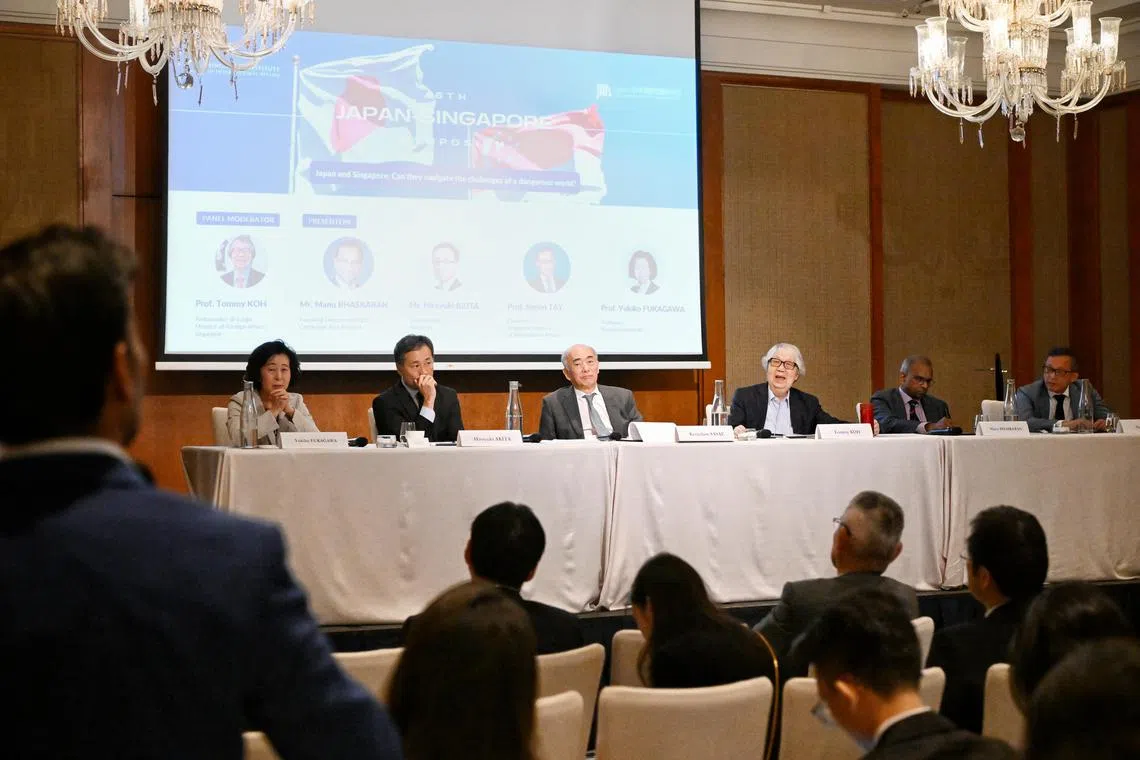S’pore and Japan have more to cooperate on as global geopolitical tensions rise: Forum
Sign up now: Get ST's newsletters delivered to your inbox

The 16th Japan-Singapore Symposium, featuring (from left) Professor Yukiko Fukagawa, Mr Hiroyuki Akita, Mr Kenichiro Sasae, Professor Tommy Koh, Mr Manu Bhaskaran and Associate Professor Simon Tay.
ST PHOTO: KUA CHEE SIONG
SINGAPORE - As like-minded partners, Singapore and Japan should build on existing economic and security ties, especially given the rising tensions in an unpredictable geopolitical environment, speakers from both countries said at a public forum on Tuesday.
In a keynote address at the 16th Japan-Singapore Symposium, Senior Minister of State for Foreign Affairs Sim Ann said it was timely for the Japan-Singapore Economic Partnership Agreement to be reviewed to keep pace with the changing interests of the business community. The agreement had entered into force in 2002 and was last updated 16 years ago.
Other areas of cooperation include digitalisation – such as artificial intelligence and cyber security – as well as sustainability and energy.
“In the region, Singapore and Japan are natural and like-minded partners. We share a commitment to regional economic integration and upholding the open, rules-based multilateral trading system,” said Ms Sim.
Strong trust between the two countries has allowed them to work together for the advancement of free and open trade, she said. Both countries are parties to the Comprehensive and Progressive Agreement for Trans-Pacific Partnership (CPTPP), the Regional Comprehensive Economic Partnership and the Indo-Pacific Economic Framework for Prosperity.
Japan’s State Minister for Foreign Affairs Shunsuke Takei, also a keynote speaker, said it was very encouraging that Prime Minister Lee Hsien Loong had called on Japan to play a greater role in regional security.
At a conference in Tokyo in May 2022,
Mr Takei said Japan’s new National Security Strategy
“We are confident that such efforts will improve the security environment and benefit countries in this region including Singapore,” he said.
The forum was co-organised by the Singapore Institute of International Affairs (SIIA) and the Japan Institute of International Affairs at the Four Seasons Hotel off Orchard Road, and was attended by about 100 people.
The wide-ranging discussion covered topics from rising tensions in the Taiwan Strait and how a proposal to revive an Asian Monetary Fund would be received, to what Japan and Singapore can learn from each other.
Panellist Manu Bhaskaran, chief executive of research and advisory firm Centennial Asia Advisors, noted that the pace of economic integration has been slow in Asean, and urged a pragmatic approach to Japan and Singapore’s cooperation.
“My own view is that highly ambitious, region-wide multilateral partnership agreements will be difficult to pull off in today’s age. What we should aim for is more practical-minded, bite-size economic integration efforts,” he said.
An example could be working on something similar to the Singapore-Johor-Riau growth triangle of the late 1980s to the mid-1990s, which transformed economies in the region substantially, said Mr Bhaskaran.
But a key difference between Japan and Singapore, said SIIA chairman Simon Tay, is that Japan is a formal United States ally, but Singapore is not, although it is a security partner of the US.
Further, Japan’s participation in the Quad security dialogue
Veteran diplomat Tommy Koh, who co-chaired the session, responded that as both countries shared a mature relationship, they would understand that the different situations faced by each country lead to differences in interests and affiliations.
A member of the audience asked how China’s potential membership in the CPTPP would change the dynamics of the grouping, adding that PM Lee had reiterated support for Beijing’s application.
Professor Koh clarified that this inaccurately invoked PM Lee.
What PM Lee said was that countries which wished to join the pact must be able to meet its high standards, said Prof Koh. There must also be agreement by the existing 11 countries to admit the applicant country.
Co-chairman Kenichiro Sasae, president of the Japan Institute of International Affairs, said there were economic, diplomatic and strategic implications to consider regarding China’s application to the trade pact, which came into effect in December 2018.
He asked whether China is prepared to meet the standards required of the pact or if it will seek exceptions, while the diplomatic question relates to whether it is willing to accept Taiwan’s potential membership.
It may also not be “strategically wise” to have China enter, with the US unlikely to join the pact in the foreseeable future, he said.
China formally applied to join the CPTPP submitted its application


